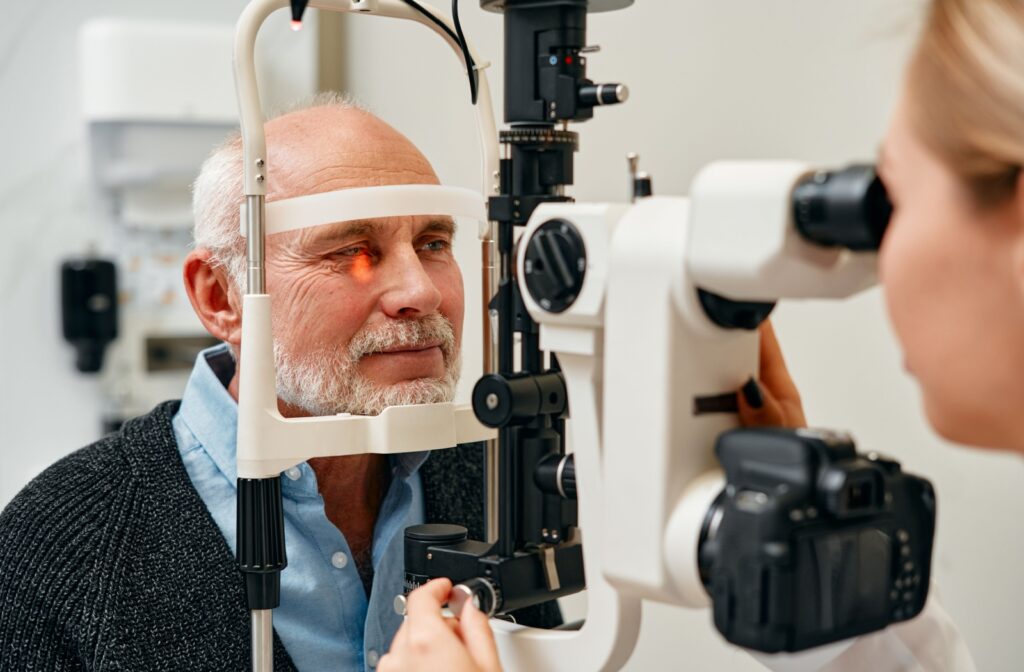Eye floaters—those waving, squiggly lines that sometimes drift through your vision—are a lot more common than most people think. Usually, they are harmless, but sometimes, eye floaters can be a sign that something more serious is occurring. So if you’re dealing with eye floaters, you may be wondering, “How can you get rid of eye floaters naturally?”
While eye floaters can’t always be eliminated, they can often be effectively prevented. Proper hydration and a balanced diet are key to maintaining your eye health. Your sleep schedule matters as well; this helps your body repair itself and rejuvenate. It also helps to wear sunglasses when outside to prevent UV radiation from damaging your eyes.
If at any point you notice a sudden increase in eye floaters alongside flashing lights and sudden pain, seek medical attention immediately.
What Are Eye Floaters?
Your eye is full of a clear, jelly-like fluid called vitreous gel. This helps to maintain the eye’s shape while allowing light to pass through to reach the retina.
As you age, this vitreous gel can change in consistency and start to form small clumps or strings. Light can’t pass through these clumps, so shadows are cast on the retina; this leads to the appearance of little specks or lines throughout your field of vision. These specks or floaters are often more visible when looking at a bright background.
Floaters can be extremely distracting, especially if you try to focus on them. However, they’re usually harmless and rarely affect your long-term vision.
What Causes Eye Floaters?
The presence of eye floaters is typically associated with age-related changes in the vitreous. As you get older, the vitreous gel begins to liquefy and shrink, causing it to pull away from the retina. This process, known as vitreous detachment, is the most common cause of floaters. It’s not an emergency; it’s just a natural change that occurs with age.
However, eye floaters can also develop due to more serious matters, for instance, due to:
- Recent injury
- Inflammation
- Infections
- Retinal damage
- Poor lifestyle, diet, or hydration habits
While eye floaters are generally harmless, this isn’t always the case. Sometimes, a sudden increase in eye floaters is a sign of something serious.
When Are Eye Floaters an Emergency?
Sometimes, a sudden increase in eye floaters is a sign of something serious. It’s unusual to start seeing more eye floaters than usual; this is a signal that a physical change is occurring in your eye.
There are several signs that an increase in eye floaters is an emergency:
- Sudden flashes of light
- A loss of peripheral vision
- Curtain-like shadows at the edge of your vision
- Sudden pain or discomfort in the eye
- A change in the size of your floaters
These symptoms are all a sign that something is pulling on your retina, detaching it from the surrounding walls. This is a medical emergency; retinal damage can lead to permanent vision loss if left unaddressed. Early intervention is crucial to preserving your vision.
How Long Do Floaters Last?
Usually, floaters don’t last for very long. If they’re caused by standard age-related changes in the eye, they should disappear in somewhere between a few weeks to a few months. Over time, the brain will automatically start to ignore them, after which they’ll be significantly less irritating.
If your floaters are being caused by inflammation—for instance, due to uveitis—they’ll typically subside once the inflammation is effectively treated. While some may take a little longer, they should also go away as your other symptoms decrease.
With eye floaters, managing the underlying cause is key. If they’re developing due to lifestyle or underlying conditions, it’s crucial to address the cause itself.

Can an Optometrist Get Rid of Eye Floaters?
While there is no definitive cure for eye floaters, your optometrist may be able to help. First, you’ll undergo a comprehensive eye exam—this lets your optometrist assess the cause of the floaters and create a treatment plan.
In some cases, if your eye floaters are significantly affecting your vision, a procedure called laser vitreolysis may be recommended. This process uses a precision laser to break up eye floaters and make them less noticeable. However, it’s important to note that not everyone is a suitable candidate for this procedure; your optometrist will need to examine your eyes to determine whether or not you’re eligible for this approach.
Another option is a surgical procedure called vitrectomy, which involves removing the vitreous gel and replacing it with a saline solution. While this method can effectively eliminate floaters, it carries potential risks and complications. It’s typically only recommended when other approaches have failed.
How to Prevent Eye Floaters
When dealing with eye floaters, a preventive approach is key. Your optometrist will likely recommend:
- Staying well-hydrated
- Maintaining a balanced diet rich in vitamins and minerals
- Wearing UV-protection sunglasses outdoors
- Keeping a regular sleep schedule to support eye health
These can all be an effective way to decrease the risk of developing eye floaters.
When to Visit Your Optometrist
Eye floaters are usually harmless, but it’s better to be safe than sorry. If you notice any change in your eye floaters, come see our team at Total Vision Novato. We can examine your eyes to determine if you’re at risk of something more serious. Book an appointment with us today to take charge of your eye health!




